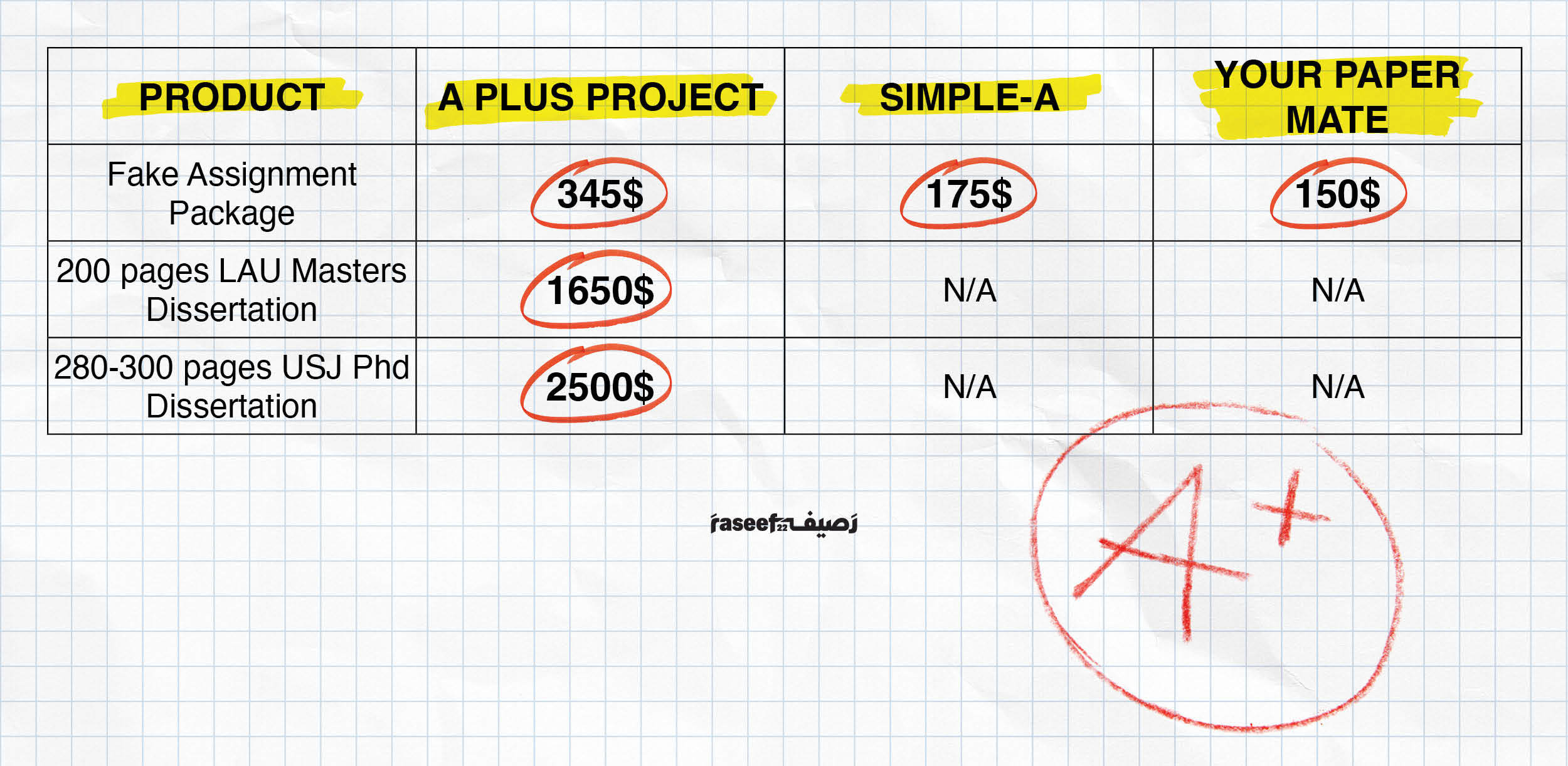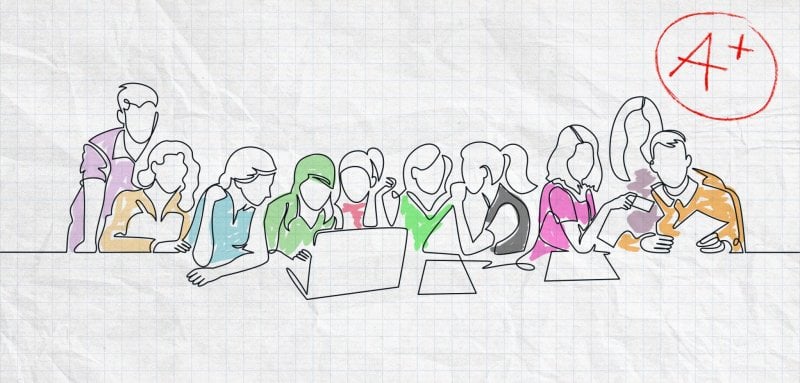Mazen gazes at his computer screen in frustration; he has a number of final projects and papers due by the end of the week. With a smile on his face, he pulls out his phone and messages the “assignment-solving” company he heard of through some friends. It doesn’t take long for the tutors there to start on his assignments. Relieved from his academic commitments, Mazen spends the rest of the week lounging around and playing video games.
A number of university students in Lebanon outsource their coursework, particularly papers and projects, to “assignment-solving” companies. Under the Lebanese Penal Code, there is no specific law explicitly forbidding the purchase or sale of academic assignments, although the practice could fall under trickery and impersonation. Nevertheless, this does not guarantee punishment for either the seller or the buyer, allowing such companies to operate with no repercussions. Dr Raad Mohsen, the Dean of Students at Lebanese American University (LAU), confirms that if a student outsources an assignment to an entity outside the university, whether a person or a company, the university is unable to address the situation.
Although this practice is legal, its impact on society is overwhelmingly negative. This phenomenon compromises the integrity of university degrees for students who use this service can secure jobs in fields of study which they are not qualified for. Lebanon’s educational system, which used to be one of the top Arab and international educational systems, has suffered immensely since the start of the economic collapse in 2019, and was further exacerbated by the Covid-19 pandemic which forced students across all ages to learn online. Students entering university are no longer at the academic level of their peers before the crisis.
A number of university students in Lebanon outsource their coursework, particularly papers and projects, to “assignment-solving” companies. Under the Lebanese Penal Code, there is no specific law explicitly forbidding the purchase or sale of academic assignments, although the practice could fall under trickery and impersonation.
An existing moral fault in Lebanese society
The economic crisis in Lebanon has left many university graduates without job opportunities, leading current students to seek alternate sources of income, such as preparing academic assignments for a fee. Furthermore, a pervasive lack of integrity exists in Lebanon in regards to cheating, where dishonesty, as exhibited in the purchase of assignments, is considered shatara (cleverness). This highlights an existing and pervasive moral fault in the fibers of Lebanese society. The normalization of cheating at the university level may subsequently steer towards continued corruption in the professional arena.
Meet the providers
Despite the presence of artificial intelligence (AI) tools such as ChatGPT and Google’s Bard, the outsourcing of entire assignments is a problem that still exists, according to Dr. Mohsen. He confirms that LAU administration exposes about three incidents of submitting purchased assignments per semester. Dr. Mohsen remembers one specific case, which occurred several years ago, where one student was found to have sold assignments to 21 other students.
The LAU code of conduct specifically prohibits buying material under section 2.2.8 of its code of conduct. The American University of Beirut (AUB) does not have a specific rule regarding the purchasing of assignments, although it does prohibit plagiarism under section 1-1-a of its code of conduct. At LAU, if a C-student suddenly submits an A+ assignment, the instructor might test their knowledge on the assignment subject. “Almost always, they cannot justify things,” admits Dr. Mohsen.
The thriving assignment market, in the absence of legal constraints, raises serious concerns about educational integrity. These phenomena affect several sectors in Lebanese society.
A number of graphic design students have also been found to have hired professional designers to complete their coursework. According to Dr. Mahmoud Tarabay, a communications instructor at LAU, this phenomenon happens very rarely but when it does, it is easily detectable. Certain technicalities in the design reveal the involvement of a professional designer.
Tutoring centers sometimes offer assignment solving services for university students and, in certain cases, even complete an entire masters degree or doctoral thesis for graduate students. Mostafa, an LAU student who previously used the services of YourPaperMate, a tutoring company with assignment solving services, confirmed that YourPaperMate is able to solve any assignment, and this is done by a real person and “not ChatGPT.”
This investigation examined three companies that offer these services: Simpla-A, A Plus Project, and YourPaperMate. Despite the unethical nature of their work, Simple-A and A Plus Project openly advertise their assignment selling services on their websites and/or social media including on Whatsapp.
Simple-A seemingly operates as a structured company, where in order to become an assignment solver, one must contact HR and complete a form proving eligibility. Simple-A also offers an exam-taking service, provided that the exam is online. YourPaperMate is a British company, but according to Mostafa, able to complete the assignments of Lebanese students. YourPaperMate even offers packages and discounts for first time customers. A Plus Project not only solves assignments, but can even complete a full masters and doctoral dissertation.
These three companies price their services differently as seen in the table below:

These companies were given a fake assignment package, consisting of three assignments divided into two English Literature papers and a research proposal. The instructions for the fake assignments (which were obtained from actual university assignments, and one produced on ChatGPT) were mostly similar, except for Simple-A, where the research methods assignment was removed.
It proved difficult to obtain a precise price list from the three companies, due to the requirement of details of the assignments. An employee at Simple A stated, “we don’t have a fixed price” and only shared prices after going over the assignments with the tutors. These were sent by an investigator going undercover as a student via WhatsApp.
A disconcerting reality
This phenomenon presents a disconcerting reality. The thriving assignment market, in the absence of legal constraints, raises serious concerns about educational integrity. These phenomena affect several sectors in Lebanese society.
The Ministry of Education: As previously mentioned, students purchasing their assignments undermine the integrity of the academic institution in which they are enrolled. Unqualified students are able to graduate with passing grades, further damaging the already broken Lebanese education system.
The Lebanese Economy: The registration status for many of these assignment-solving companies is unknown. Unregistered companies operate illegally and avoid paying taxes, which further damages the Lebanese treasury. Unqualified graduates entering the workforce also damages the quality of labor, and thus, the Lebanese economy.
Universities: These companies damage the very idea of universities as they pave the way for a dangerous atmosphere of cheating and laziness.
Society: This phenomenon reinforces the previously mentioned underlying belief that cheating is shatara, which causes further corruption to a country already marred by wars, crises, and darkness due to the deeply-rooted, systemic corruption.
All affected sectors should unite to combat this phenomenon. Universities, the Ministry of Treasury, and the Ministry of Education must coordinate with law enforcement to outlaw this practice and educate students on its dangers. This coordinated effort is essential to salvage the Lebanese education system and, more importantly, society as a whole.
Raseef22 is a not for profit entity. Our focus is on quality journalism. Every contribution to the NasRaseef membership goes directly towards journalism production. We stand independent, not accepting corporate sponsorships, sponsored content or political funding.
Support our mission to keep Raseef22 available to all readers by clicking here!
Interested in writing with us? Check our pitch process here!





